

What is money?
BBC Radio 4 - Promises, Promises: A History of Debt, The Moral Power of Debt. BBC Radio 4 - Promises, Promises: A History of Debt, What Is Debt? BBC Radio 4 - Promises, Promises: A History of Debt, The Origin of Money. BBC Radio 4 - Promises, Promises: A History of Debt, The Theology of Debt. Anthropologist David Graeber explores the theology of debt.
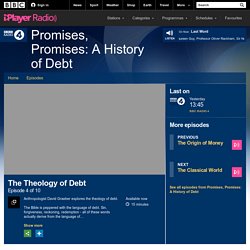
The Bible is peppered with the language of debt. BBC Radio 4 - Promises, Promises: A History of Debt, The Classical World. BBC Radio 4 - Promises, Promises: A History of Debt, The Medieval Period. BBC Radio 4 - Promises, Promises: A History of Debt, The Conquistadors and the Birth of the Modern World Economy. BBC Radio 4 - Promises, Promises: A History of Debt, The Birth of Capitalism. BBC Radio 4 - Promises, Promises: A History of Debt, The International Politics of Debt. BBC Radio 4 - Promises, Promises: A History of Debt, Hope. Monnaies complémentaires & alternatives - Future of money. The Joule Standard.com. The Joule Standard. Brian McConnell is a software developer, author and technology entrepreneur based in San Francisco.
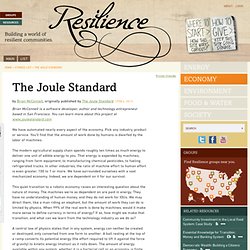
You can learn more about this project at www.joulestandard.com We have automated nearly every aspect of the economy. Pick any industry, product or service. You’ll find that the amount of work done by humans is dwarfed by the labor of machines. The modern agricultural supply chain spends roughly ten times as much energy to deliver one unit of edible energy to you. This quiet transition to a robotic economy raises an interesting question about the nature of money. A central law of physics states that in any system, energy can neither be created or destroyed, only converted from one form to another.
What exactly is energy? Energy is the capacity to do a certain amount of work. Plot of energy densities for variety of materials (source Wikimedia Commons) Energy storage is only one part of the equation. The Wrong Frame of Reference Let’s consider your monthly utility bill as an example. Bitcoin, Energy and the Future of Money — Armchair Economics. While it’s impossible to predict how the Bitcoin experiment will pan out, it has already succeeded by creating a decentralized system for settling transactions, and by re-igniting interest in alternate currencies.
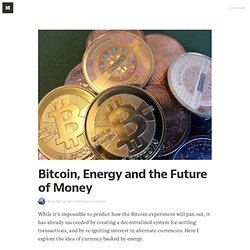
Here I explore the idea of currency backed by energy. A few months ago I wrote an article, The Joule Standard, which describes the idea of denominating a currency in units of energy (see also joulestandard.com). The idea is worth a look because 90 to 99% of the mechanical work done in modern economies is done by machines, which are “paid” in energy. The energy supply defines how much productive work can be done, while the efficiency with which we use energy defines how much utility can be created from that energy supply (widgets per kilowatt-hour).
Freicoin - peer-to-peer demurrage currency. Freicoin (Freicoin) sur Twitter. Finance 2.0. Tomáš Sedláček (economist) Tomáš Sedláček Tomáš Sedláček (born 23 January 1977) is a Czech economist and university lecturer.
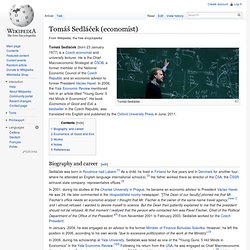
He is the Chief Macroeconomic Strategist at ČSOB, a former member of the National Economic Council of the Czech Republic and an economic advisor to former President Václav Havel. In 2006, the Yale Economic Review mentioned him in an article titled "Young Guns: 5 Hot Minds in Economics". His book Economics of Good and Evil, a bestseller in the Czech Republic, was translated into English and published by the Oxford University Press in June, 2011. Sedláček was born in Roudnice nad Labem.[1] As a child, he lived in Finland for five years and in Denmark for another four, where he attended an English-language international school(s).[2] His father worked there as director of the ČSA, the ČSSR airtravel state company, representative offices.[3] In 2001, during his studies at the Charles University in Prague, he became an economic advisor to President Václav Havel. Economics of Good and Evil:The Quest for Economic Meaning from Gilgamesh to ... - Tomas Sedlacek. Meet the future of branded currency - Paul Kemp-Robertson.
Amazon Coins. Google Wallet. Mark Wagner Inc. Mark Wagner - Money is Material. Kunst Reserve Bank - Welkom bij de Kunst Reserve Bank. @ArtReserve Bank sur Twitter. Eindhoven krijgt vestiging Kunst Reservebank. EINDHOVEN - De Kunst Reservebank wil zich tijdelijk in Eindhoven vestigen.
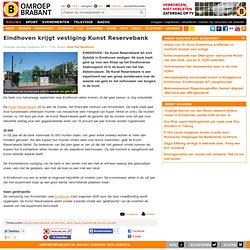
De bank haalt geld op voor een filiaal op het Eindhovense Stationsplein óf in de buurt van het Van Abbemuseum. De Kunst Reservebank is een experiment van een groep kunstenaars over de waarde van geld en het vertrouwen van burgers in de munt. De bank zou halverwege september naar Eindhoven willen komen; of dat gaat lukken, is nog onduidelijk.
De Kunst Reservebank zit nu aan de Zuidas, het financiële centrum van Amsterdam. De bank slaat daar door kunstenaars ontworpen munten van nieuwzilver (een mengsel van koper, nikkel en zink). 20.000In vijf jaar wil de bank maximaal 20.000 munten slaan; van geen enkel ontwerp worden er meer dan honderd gemaakt. Google’s brilliant plan to get millions to adopt its e-money system: Gmail. In May 2013, Google soft-launched a straightforward scheme for sending money to other people.
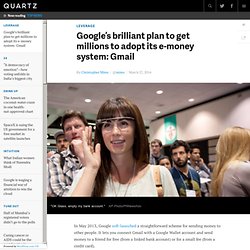
It lets you connect Gmail with a Google Wallet account and send money to a friend for free (from a linked bank account) or for a small fee (from a credit card). While the service has been available since last summer to anyone who had a Google Wallet account or had already been sent money via Gmail, Google now seems to be starting to push it out to the broader public. (The company declined to comment for this article; in May it said the rollout would happen “over the next 18 months.”)
I seem to be one of the earlier people to have been offered the new feature unbidden, as a promotion in Gmail, and it provides a glimpse of how Google plans to pitch its e-money service to the masses. Waarom geld niet alleen het terrein van monetaire gekkies is. Door de geschiedenis heen heeft menigeen gedacht de sleutel tot de opheffing van elk vorm van economisch onrecht te vinden in het geldsysteem.
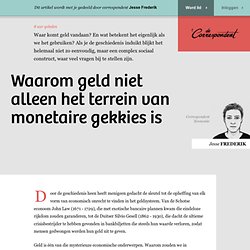
Van de Schotse econoom John Law (1671 - 1729), die met exotische bancaire plannen kwam die eindeloze rijkdom zouden garanderen, tot de Duitser Silvio Gesell (1862 - 1930), die dacht de ultieme crisisbestrijder te hebben gevonden in bankbiljetten die steeds hun waarde verloren, zodat mensen gedwongen werden hun geld uit te geven. Geld is één van die mysterieuze economische onderwerpen. Waarom zouden we in godesnaam intrinsiek waardeloze stukjes papier verzamelen? Gratis geld. Stel dat we iedereen in Nederland een basisinkomen geven, zonder voorwaarden.

Klinkt te mooi om waar te zijn?